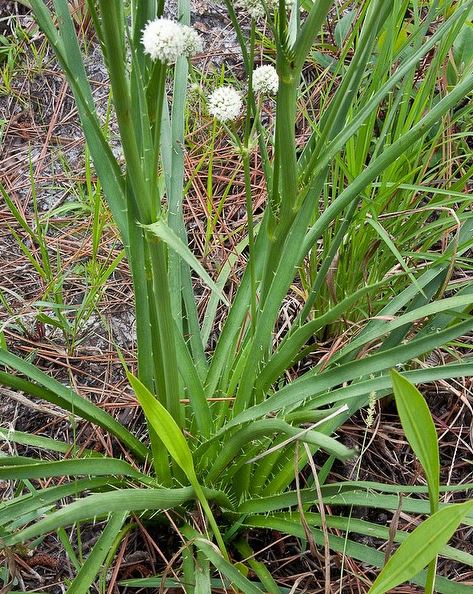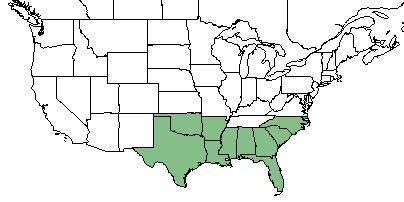Difference between revisions of "Eryngium yuccifolium"
(→Description) |
|||
| Line 25: | Line 25: | ||
==Description== | ==Description== | ||
<!-- Basic life history facts such as annual/perrenial, monoecious/dioecious, root morphology, seed type, etc. --> | <!-- Basic life history facts such as annual/perrenial, monoecious/dioecious, root morphology, seed type, etc. --> | ||
| − | ''E. yuccifolium'' is a perennial forb/herb of the ''Apiaceae'' family native to North America. <ref name= "USDA Plant Database"> USDA Plant Database [https://plants.usda.gov/core/profile?symbol=ERYUS https://plants.usda.gov/core/profile?symbol=ERYUS] </ref> | + | ''E. yuccifolium'' is a perennial forb/herb of the ''Apiaceae'' family native to North America. <ref name= "USDA Plant Database"> USDA Plant Database [https://plants.usda.gov/core/profile?symbol=ERYUS https://plants.usda.gov/core/profile?symbol=ERYUS] </ref> It has grasslike parallel-veined leaves with a stout furrowed stem and the flowers borne in a dense, stout-stemmed head. <ref name= "Sievers"> Sievers, A. F. (1930). American medicinal plants of commercial importance. Washington, USDA. </ref> |
==Distribution== | ==Distribution== | ||
Revision as of 20:24, 15 June 2018
Common name: button eryngo [1], moccasin-master [2], southern/northern rattlesnake master [2]
| Eryngium yuccifolium | |
|---|---|

| |
| Photo by John B. of Blue Moon | |
| Scientific classification | |
| Kingdom: | Plantae |
| Division: | Magnoliophyta - Flowering plants |
| Class: | Magnoliopsida - Dicots |
| Order: | Apiales |
| Family: | Apiaceae |
| Genus: | Eryngium |
| Species: | E. yuccifolium |
| Binomial name | |
| Eryngium yuccifolium Michx. | |

| |
| Natural range of Eryngium yuccifolium from USDA NRCS Plants Database. | |
Contents
Taxonomic Notes
Synonyms: Eryngium synchaetum (A. Gray ex J.M. Coult. & Rose) J.M. Coult. & Rose
Varieties: Eryngium yuccifolium Michaux var. synchaetum A. Gray ex Coulter & Rose; Eryngium yuccifolium Michaux var. yuccifolium
Description
E. yuccifolium is a perennial forb/herb of the Apiaceae family native to North America. [1] It has grasslike parallel-veined leaves with a stout furrowed stem and the flowers borne in a dense, stout-stemmed head. [3]
Distribution
E. yuccifolium can be found along the southeastern coast of the United States from Texas to North Carolina. [1]
Ecology
Habitat
E. yuccifolium is found in wet savannas, especially those over calcareous clay soils. [2]
Phenology
E. yuccifolium flowers April-August and November. [4]
Fire ecology
The spread of E. yuccifolium is highly favored by fire. [5] It has been shown to increase establishment of seedlings as an effect of fire. [6]
Conservation and Management
E. yuccifolium is listed as endangered/extirpated by the Maryland Natural Heritage Program Department of Natural Resources, and as threatened by the Michigan Natural Features Inventory Department of Natural Resources and by the Ohio Department of Natural Resources Division of Natural Areas and Preserves. [1]
Cultivation and restoration
Photo Gallery
References and notes
- ↑ 1.0 1.1 1.2 1.3 USDA Plant Database https://plants.usda.gov/core/profile?symbol=ERYUS
- ↑ 2.0 2.1 2.2 Weakley, A. S. (2015). Flora of the Southern and Mid-Atlantic States. Chapel Hill, NC, University of North Carolina Herbarium.
- ↑ Sievers, A. F. (1930). American medicinal plants of commercial importance. Washington, USDA.
- ↑ PanFlora Author: Gil Nelson URL: http://www.gilnelson.com/PanFlora/ Date Accessed: 5/21/18
- ↑ Curtis, J. T. and M. L. Partch (1948). "Effect of fire on the competition between blue grass and certain prairie plants." American Midland Naturalist 39: 437-443.
- ↑ Curtis, J. T. and M. L. Partch (1948). "Effect of fire on the competition between blue grass and certain prairie plants." American Midland Naturalist 39: 437-443.